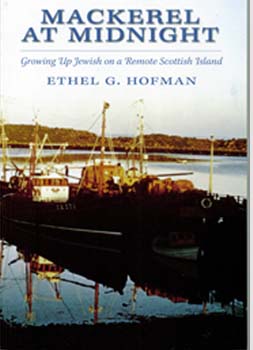|
By Donald H. Harrison
 SAN DIEGO—It’s hard to imagine anyone confessing to a certain fondness for a thieving sea captain, but if the goniff hadn’t tricked some Belarussian “greeners” into thinking that Scotland was America—prompting them to get off his ship so he could re-sell their steerage space—Ethel Hofman’s father, Harry, never would have been in Scotland in the first place, and chances are his marriage to her mother Jean never would have been arranged by a Scottish Jewish shadchan. And in that case, there'd be no Ethel. SAN DIEGO—It’s hard to imagine anyone confessing to a certain fondness for a thieving sea captain, but if the goniff hadn’t tricked some Belarussian “greeners” into thinking that Scotland was America—prompting them to get off his ship so he could re-sell their steerage space—Ethel Hofman’s father, Harry, never would have been in Scotland in the first place, and chances are his marriage to her mother Jean never would have been arranged by a Scottish Jewish shadchan. And in that case, there'd be no Ethel.
So, for gourmets who like to read Ethel’s cooking column in San Diego Jewish World, it all worked out for the best. On the other hand, for Ethel’s mother, Jean, living with Harry in the Shetland Islands—as the only Jewish family there—life could pose its problems. Harry had a wonderful knack for getting along with customers of his general store. The Scottish fishermen and farmers liked the way he schmoozed, even if they didn’t know exactly what that word meant. They appreciated his ability to anticipate their needs and sell goods to them at a fair price.
But the charm wore off Harry with each step he ascended to the flat above the store on Commercial Street in Lerwick. From the point of view of Jean, Harry transformed himself into a grumbling, short-tempered man – seemingly mellowing only when Jean served up the eastern European Jewish foods that reminded him of his boyhood.
Lerwick was a town where food was fresh, going from the garden or fishing boat right to the kitchen. It being the custom of women to drop into each other’s kitchens “for a taste,” the ability to prepare tasty food was a key to social status. Except for certain soups which the author’s mother never could seem to master, Jean was a wonderful cook, excelling in both traditional Jewish foods and in local fare. Sometimes, a touch of creativity would enter into her kitchen, and she would blend traditions.
Ethel was a willing learner, and one of her favorite memories is of a time that as a 12-year-old she was entrusted with whipping up some snacks for the visiting ladies – crackers with tomato and melted cheese -- that won surprised compliments.
World War II brought its special dangers—and rewards. Only 200 miles by sea from Nazi-occupied Norway, an invasion of the Shetland Islands might have meant certain death for the only Jews in town, whose store bore their surname: Greenwald’s. But the war also prompted the British to garrison the island—and among the many thousands of British troops stationed there were hundreds of Jews whom Jean took special responsibility for.
Go to the top of right column
|
|
 She organized Pesach meals for the boys—and woe onto the Scottish merchant who dared send vinegary wine for the mass seder. The phone lines between Lerwick and Glasgow on the mainland may still be scorched by Jean’s exclamations about the perfidy of sending inferior drink to boys who were defending their country. She organized Pesach meals for the boys—and woe onto the Scottish merchant who dared send vinegary wine for the mass seder. The phone lines between Lerwick and Glasgow on the mainland may still be scorched by Jean’s exclamations about the perfidy of sending inferior drink to boys who were defending their country.
Jean was nothing if not resolute. Notwithstanding their isolation from Yiddishkeit, she made certain that her children knew Jewish beliefs, holidays, and, in Jean’s case, Jewish cooking. And she instilled in her oldest daughter such a reverence for things Jewish that she would grow up to become a leading authority on Jewish cooking.
The book integrates approximately four dozen recipes into the narrative – stories about Lerwick often revolving around the meals that the family ate. The variety of recipes is astounding and mouth-watering. Here are just some of them: Butter–crusted vegetable kugel; sweet and sour halibut; Johann’s hearty red lentil soup with doughboys (potato dumplings); kichel; crofter’s cookies; coggly woggly (a beverage made with milk and eggs); rhubarb chutney; fried gefilte fish; honey lockshen kugel; golden (all beef) sausage rolls; Shetland stap (made with fish livers); haddock fried in seasoned matzo meal; matzo plum pudding; white whiskied fruit cake with marzipan, and for the neighbors, how about a Shetland Christmas cake?
Of course, we cannot forget the titled dish—nor the story that inspired it—of Ethel and husband Walter bringing their children, Andrew and Michael, from America back to her girlhood home in the Shetlands, where it stays light beyond midnight, and their adventure fishing for mackerel, putting them to boil, and adding butter, salt and pepper for a midnight snack.
Except for this anecdote, the memoir cum recipe book leaves off with Ethel moving to America to stay with an aunt. We’ve got to guess that sometime in the future, the gourmet cook and writer will share her adventures in America—and tell the story of how she and Walter met and married.
|
|

